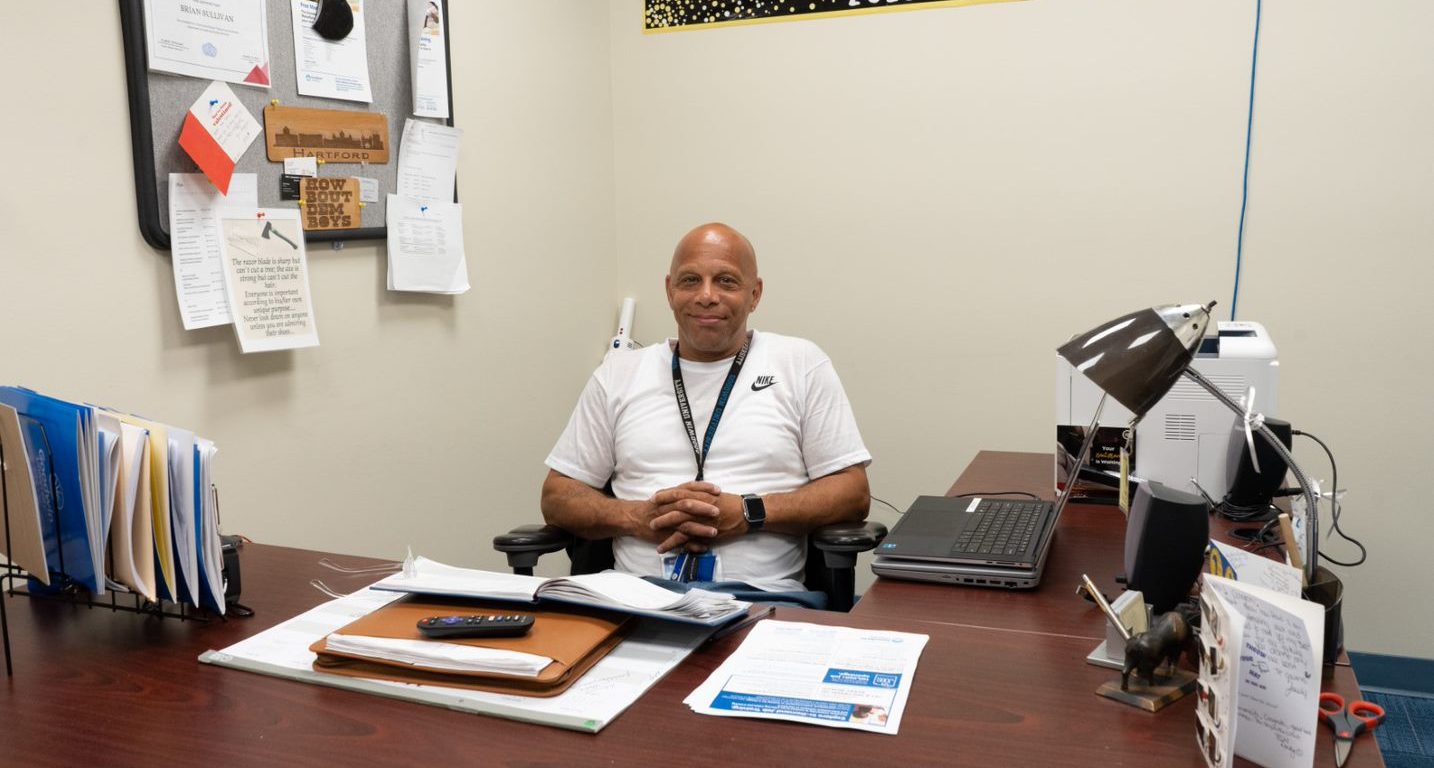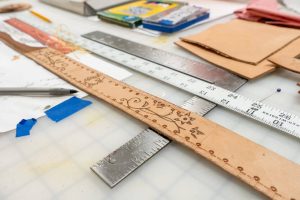How ENet Alumnus Brian Sullivan and Goodwin University Are Bringing New Possibilities to Park Street
Over the past three years, Connecticut has experienced a significant shortage of Manufacturing professionals. In the field, approximately 11,000 open positions are currently waiting to be filled by eligible candidates. Given that the state’s unemployment rate currently rests at about 4%, one might think these positions would fill quickly. Yet for many of those struggling to find work, these opportunities seem inaccessible. After all, without Manufacturing experience or credentials, a job in the field is unattainable — right?
Believe it or not, that isn’t the case. With a working knowledge of Manufacturing, you can qualify for entry-level positions without a degree or certificate. Goodwin University is committed to helping individuals find secure, high-quality employment that satisfies the broad needs of Connecticut’s manufacturing industry. Last year, Goodwin University received a $1 million grant to open the Community Manufacturing Training Center (MTC) on 590 Park Street in Hartford, CT. A cost-free and walk-in friendly center, the MTC is providing Park Street locals with the opportunity to pursue free training and achieve stable employment.
For Community Manufacturing Center Coordinator Brian Sullivan, a personal and professional journey has come full circle. A Park Street native himself, Sullivan is no stranger to the adversity faced by his local community. As the MTC’s coordinator, he goes above and beyond. Sullivan and the MTC are not only preparing students for fulfilling careers — they’re also establishing a safe and supportive haven, located right at the heart of Park Street.
Conflict in a local community
Walking down Park Street, you could easily imagine that you’re somewhere else entirely. The palpable energy of the neighborhood is like that of a New York City borough — the traffic flows down a stretching city road, brimming with bustling pedestrians, vibrant murals, and charming mom-and-pop shops.
Still, Park Street is subject to a troubling juxtaposition. “You look across the street and there’s a beautiful new library,” describes Brian Sullivan. “But then when you look at the building next to it, it’s been abandoned for years.”
This stark contrast speaks to a local legacy. In 2020, Hartford was named the most dangerous city in Connecticut. The southernmost neighborhoods, including Park Street, were deemed to have the highest rates of violent crime. “Park Street is an area with gang affiliations and a lot of drug activity,” Sullivan explains. “It becomes easy for people living here to feel trapped and as though they have no options.”
Rewriting a neighborhood’s narrative
Sullivan speaks from personal experience. Having served an incarceration sentence over 20 years ago, he has first-hand empathy for those struggling to find their way on Park Street.
“After I was incarcerated,” he recalls, “I found myself considering how I’d ended up on the path I did. I wondered whether I was a product of my environment, but I felt the answer couldn’t be so simple. The Commissioner of the Department of Corrections had grown up in the same neighborhood as me, going to the same schools. So how did we end up in opposite positions?”
Contemplating this, Sullivan determined that his experiences on Park Street were shaped by many things. “Your perception of your environment, your attitude, the opportunities you have, and other factors play a role in shaping your outlook,” he offers.
Now working as the MTC’s coordinator, Sullivan is committed to establishing a Park Street sanctuary — a safe and welcoming space where community members can learn and develop career-ready skills. “When people come to the center, they say it’s like a little oasis. We want to provide people with hope by establishing a better, safer, and more productive outlet,” Sullivan explains. “We can help end the vicious cycle that often plagues people struggling to get by in underprivileged communities. Ultimately, we aim to rewrite the narrative of Park Street, lower incarceration rates, and help rebuild local families.”
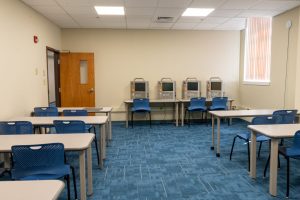
Planting seeds on Park Street
The philosophy of the MTC is simple but powerful: to inspire interest and curiosity in the broad field of manufacturing. “People say you can bring a horse to water, but can’t make them drink,” Sullivan offers. “At the Manufacturing Center, we say that’s OK — but you can feed them salty peanuts and make them thirsty. That’s what we’re doing, here. We’re planting seeds of inspiration, introducing new options to the community, and making people crave those opportunities.”
At the MTC, students are free to explore various career paths in Manufacturing. The center is home to numerous simulation labs, where students can develop job-ready skills in Welding, Computer Programming, HVAC, Electrical, and more. It doesn’t stop there, either — attendees can also enjoy opportunities for creative expression with jewelry making, leather making, wood engraving, sewing, and more.
The MTC ultimately aims to enroll students in Manufacturing degree and certificate programs. However, the center is free to attend and walk-in friendly. Moreover, Sullivan stresses that students needn’t enroll in a program to benefit from the MTC. “Due to the shortage of Manufacturing workers,” he explains, “many employers aren’t necessarily looking for degree or certificate-holders. You can find work if you have a baseline knowledge of Manufacturing.”
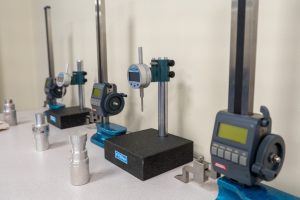
Establishing a center for support
Along with Outreach Liaison Linda Martinez, Sullivan helps the center establish connections with community churches, halfway houses, correctional facilities, and other local organizations. “We want people to enroll, but that doesn’t always happen,” Sullivan explains. “People have a lot of circumstances they’re dealing with, and that can make formal education seem inaccessible.”
Consequently, Sullivan finds that offering support is often the first priority. “We’re doing more than providing training,” he explains. “We’re taking a holistic approach, which really lends itself to Goodwin’s philosophies about student support. We often direct people to services that can help with food, counseling, treatment for substance abuse disorders, and other necessities. We also collaborate with the Hispanic Health Council to provide addresses for shelters and other local centers that can help people find housing. No one can succeed professionally if those needs aren’t being met.”
Exemplifying this holistic approach to student support, Sullivan describes how the MTC helped transform the life of a Venezuelan immigrant. Having recently settled in the Park Street area, this student began visiting the center daily. “She didn’t know any English when she got here, but with the help of Linda Martinez and the Hispanic Health Counsel (with whom we share this building,) she quickly began learning,” Sullivan recalls.
By developing her English-speaking skills, receiving job-ready training, and establishing a baseline knowledge of Manufacturing, this student secured stable employment working for Amazon. However, because of the compassionate support offered by the MTC, the center maintains a special place in her heart. “When she’s not working, she comes back here to help instructors teach sewing classes for non-English-speaking students,” Sullivan proudly shares. “She’s doing all of this after overcoming food insecurity, language barriers, and unemployment.”
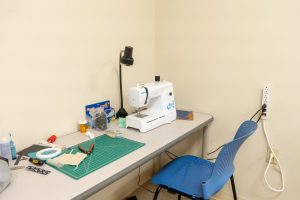
At Goodwin, we’re dedicated to helping students overcome barriers to higher education. We offer a selection of SNAP E&T programs, which are available to eligible SNAP recipients. Learn more about our SNAP E&T programs today!
Finding inspiration from experience
For Sullivan, the importance of holistic student support can’t be understated. It was during his own incarceration that Sullivan made a life-changing choice — he enrolled in Goodwin’s ENet program.
The Entrepreneurial Network (ENet) program provides currently or formerly incarcerated individuals with the opportunity to obtain a Business certificate. As a program based on hope, opportunity, and perseverance, ENet provides support and inspiration for those looking to successfully reestablish themselves. “Leaving prison, you face a lot of adversity, but you can succeed if you have a realistic plan,” Sullivan explains. “That’s part of why ENet has been so fantastic for the Department of Corrections. People can explore new ideas and gain relevant, job-ready experience.”
When it comes to ENet, Sullivan is something of an expert. In addition to completing all of Goodwin’s ENet offerings, he designed new programs and established CHAMPS — an organization dedicated to helping formerly incarcerated men find success when reentering society. “The biggest pitfalls to reintegration are unrealistic expectations, unhealthy thinking, and self-victimization,” Sullivan explains. “People struggle to face the issues that led to their incarceration and can easily fall back into the same patterns once they’re out of prison.”
Overcoming the obstacles
Sullivan’s personal and professional experiences have lent well to his role on Park Street. At the MTC, he helps students address and overcome educational, social, and personal barriers. Although this is the most challenging aspect of his role as coordinator, it is also the most rewarding. Furthermore, Sullivan believes that by simply being present, Goodwin can influence and inspire the community. “Plenty of people just see the building and come inside to learn more,” Sullivan observes.
Sullivan recalls how one such instance led to an enrollment. “A man was driving by the center, and, on a whim, he decided to pull over and come inside,” Sullivan recounts. “He never planned on going to school. Once we started talking, we found out that we had mutual friends and a similar background.”
After building rapport with the visitor, Sullivan saw the unexpected occur. “On Sunday night, I got a phone call from an unknown number, and it was him. He told me that he was interested in pursuing Robotics but was worried about his math skills,” he explains. “We worked with him to explore the resources and programs at the university and were able to find a program that fit his skills and interests. He’s now preparing to help the community by earning his degree in Human Services.”
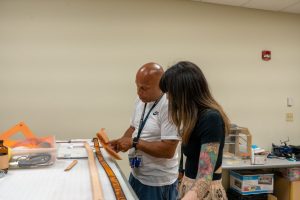
A hopeful horizon
As Brian Sullivan points out, the center is still establishing its role in the community. Its story remains largely unwritten, and the opportunities are endless. In addition to staying open later and extending its hours to Saturday, the center will be expanding the breadth of its services. In the coming months, the MTC will see the addition of a Welding lab, ESOL classes for English language learners, and youth-oriented programming for ages 5-21. By establishing these additions, Sullivan hopes the MTC will attract more members of the Park Street community.
As the Park Street narrative continues being rewritten, other organizations plan to bring support services to 590 Park Street, including Hartford Healthcare, UConn, Charter Oak Health Center, and more. “In this building, people will not only be able to receive training, but services ranging from dental care to immigration law,” Sullivan projects.
Goodwin will also be expanding its recruitment efforts by bringing a second MTC to the northern end of Hartford. Coming soon to 1229 Albany Ave., the new MTC will provide the same programming that’s offered at the Park Street center. Although Sullivan has assisted with planning the Albany Ave. center, he will continue working in the community closest to his heart.
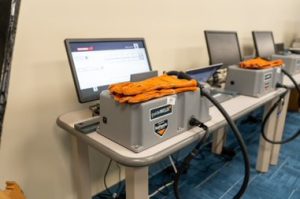
A promising future for Park Street
Sullivan notes that by establishing the MTC on Park Street, Goodwin has set itself apart from other universities. “Hartford has a lot of colleges,” Sullivan observes, “but Goodwin is the first to establish a base here. By being on Park Street, we’re showing the community that they deserve our support.”
Sullivan hopes the Community Manufacturing Training Center will serve as a beacon of hope. “Above all else, I want the community to know that we’re here because we genuinely care about them,” Sullivan offers. “All our programs are free, and nobody is here for a paycheck. We’re here to help — and when you come to Goodwin, you’re part of the family for life.”
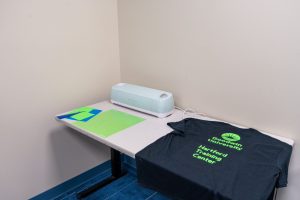
At Goodwin University, we start with you. Your personal and academic success are our priorities — that’s why we offer comprehensive student support services, including financial aid, the Ann B. Clark Co-op, free counseling, career services, and more. Better still, our career-focused programs are flexibly designed to fit your scheduling needs, giving you the freedom to earn your degree or certificate on your own timetable.
Learn more about joining the Goodwin family today! Call 800-889-3282 or text 860-467-1511.
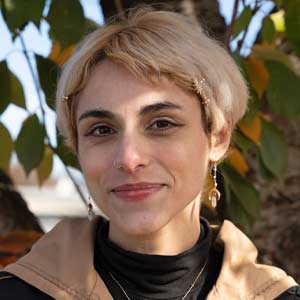
Bri Gagné is a content developer at Goodwin University, bringing backgrounds in literary studies, creative storytelling, Universal Design for Learning (UDL), and social justice. They earned their bachelor’s degree in English Literature, Film Studies, and Gender Studies from University of Connecticut and a master’s in Elementary Education from Eastern Connecticut State University.
After teaching English abroad and locally, Bri transitioned to a full-time writing career, contributing to the University’s educational narratives and brand-building efforts. They are currently earning their Master of Fine Arts in Popular Fiction Writing and Publishing at Emerson College.

